Engage your students, make use of their tech skills and promote learning by creating social media posts
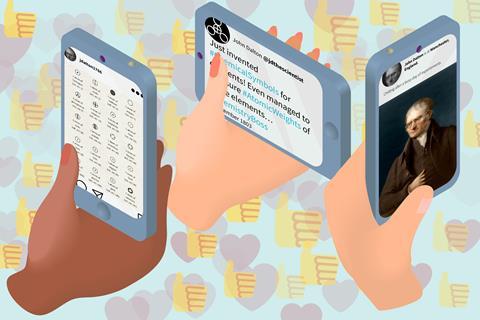
Recent changes to GCSE chemistry specifications have placed increased focus on how scientific ideas and explanations develop over time as new evidence emerges. For example, the development of the modern periodic table. Analysing early versions of the periodic table is an interesting area of study; however, it can often be content heavy and difficult to emphasise to students what they need to know.
There is a wide array of online resources on the development of the modern periodic table, including the RSC’s Development of the periodic table, making it an excellent opportunity to develop pupils’ research skills. What I’ve found, however, is that without setting clear guidelines and objectives, there can be vast differences between what students produce from their research. While some develop lengthy stories and essays, others submit a few lines of poorly explained narrative which don’t quite link together. To combat this, I took a step back from the content and thought about how I could simplify the core ideas to help my students understand the importance of the scientific process without getting too overwhelmed. I wanted to present this in a format they are used to, and employ the use of clear, accessible language; hence Social media scientists was born.
Prior knowledge
Students will need to understand:
- Atomic structure: including the arrangement of subatomic particles in an atom
- The current layout of the periodic table, including the meaning of ‘mass number’ and ‘atomic (proton) number’, and the arrangement of elements in groups and periods
While the latter could be covered in subsequent lessons, students pick up on the problems with each model more if they understand why they don’t ‘fit’ with our current understanding of elements.
Lesson structure
Following a quick recap on the key concepts of atomic structure, I discuss the current layout of the periodic table with my students. I make sure to highlight key ideas such as:
- Elements are placed in order of atomic (proton) number
- The arrangements of elements in groups of similar properties
- Elements in the same group have the same number of outer-shell electrons
We discuss whether the periodic table has always looked like it does today, and possible reasons behind this. This is a good opportunity to recap the discovery of the atomic model. Protons, neutrons and electrons were all discovered at different points throughout history, so scientists may not have been aware of the three key points above when developing their periodic tables.
I then introduce the activity to my students: they must develop social media profiles and posts for each scientist who contributed to the development of the modern periodic table. This usually creates a buzz of excitement in the room!
Find the instructions and an example on the Education in Chemistry website: rsc.li/3K7My81
Instructions
Using your textbook and internet resources to help you, search for the scientists and their contributions to the development of the modern periodic table.
-

Profile pic and bio
Share your favourite ‘selfie’ of the scientist and key details about them.
-

Tweet it
In just 280 characters, write a tweet about what the scientist contributed to the periodic table. Don’t forget to timestamp their tweet – when did this happen?
-

Insta-shot
Share an Instagram-worthy snap of the scientist’s version of the periodic table.
-
Extension: make a timeline by placing the scientists and their theories into chronological order.
As a class, we create examples of each type of social media post. This can be modelled to students by opening a webpage or relevant pages of their textbook, reading the information together and then deciding how to condense the key ideas into engaging posts.
For example, John Dalton contributed to the periodic table by publishing his ideas about atoms in the early 19th century:
-
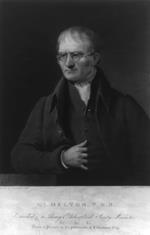
Profile pic and bio
John Dalton
Born on 6 September 1766
Lives in Manchester, Lancashire
From Eaglesfield, Cumbria
-

Tweet it
John Dalton @Jn.Dalton Sep 1803I just invented #ChemicalSymbols for elements! Even managed to measure #AtomicWeights of some elements … #ChemistryBoss
-
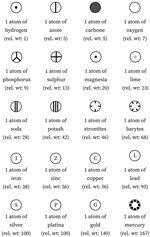
Insta-shot
77 likes
John Dalton Making gains in the lab #AtomicWeights
View all 8 comments
3 hours ago
As a class, we create examples of each type of social media post. This can be modelled to students by opening a webpage or relevant pages of their textbook, reading the information together and then deciding how to condense the key ideas into engaging posts.
The following lesson, we come together to review the social media profiles and posts they’ve created. We discuss why some models didn’t work for all elements and why new ideas needed to be developed. The remainder of the lesson can be spent practicing exam-style questions linked to the topic.
How it helps
The main benefit of this activity is that it frees up lesson time to discuss the ‘hows’ and ‘whys’ rather than the more accessible ‘whats’. Rather than fact learning, we focus on comparisons, evaluations and explanations, allowing me to offer guidance to my pupils rather than simply delivering content. This has really helped to improve the quality of my students’ answers to exam-style questions. Having the opportunity to practice and refine their technique after receiving instant feedback is a much more meaningful use of our lesson time.
The task additionally allows us to focus on the scientific process. More able students tend to pick up on ideas of why previous models failed or didn’t fit for all elements in their tweets, often using the tweet platform to ‘call out’ other scientists and their models. While this provides an element of humour to the lesson, it also helps us focus on how each model built upon the ideas of others.
Condensing the information into bite-sized chunks has aided my students in their revision too. Rather than ploughing through lengthy notes, the information they need is summarised in a visual, easy-to-digest resource which they can refer to when applying their knowledge to exam-style questions.
Social media scientists is a firm favourite in my classroom, and one which I rely on year-on-year to engage my students, make use of their tech skills, praise their sense of humour and promote their learning. It’s a fantastic opportunity to share their work on our departmental twitter page too!
Find more resources
- Liked this activity? Develop your 14–16 learners’ creativity further by highlighting Women in chemistry using this resource linking chemistry with the UN’s Sustainable development goal 5, achieve gender equality. The resource includes a Wikipedia page template, poster layout and tips on writing engaging content.
- Meet Fernando, a science communicator who shares scientific knowledge with the public, and Emma who combines creativity and chemistry as a senior picture editor.
- Improve students’ understanding through writing with these tips and downloadable structure strips for rates of reaction.
Social media scientists is a firm favourite in my classroom, and one which I rely on year-on-year to engage my students, make use of their tech skills, praise their sense of humour and promote their learning. It’s a fantastic opportunity to share their work on our departmental Twitter page (@JAGS_Chemistry), too!
Louise Hussein





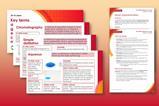
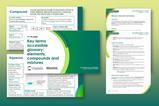







2 readers' comments